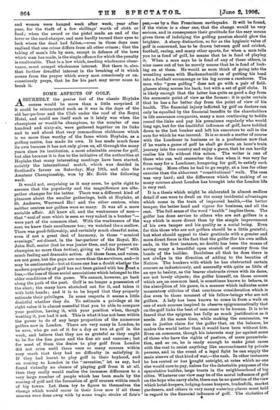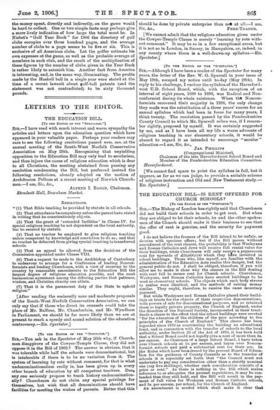SOME ASPECTS OF GOLF.
ASSUREDLY the genius loci of the classic Hoylake course would be more than a little surprised if it could be reincarnated such as it was in the days of the old bar-parlour and the Club under the roof of the Royal Hotel, and could see itself such as it lately was when the champions or would-be champions, to the number of one hundred and sixty-six, were gathered together on its links and in and about that very commodious clubhouse which is no more than worthy of the fame which Hoylake, as a golfing centre, has made its own. It has made much fame
its own because it has not only given us, all through the many years since its institution, a most admirable course for golf, but also because it is due to the initiative of the authorities at Hoylake that many interesting meetings have been started, notably the international match, which was decided in Scotland's favour on Saturday, May 19th, and also the Amateur Championship, won by Mr. Robb the following week.
It would not, surprising as it may seem, be quite right to assume that the popularity and the magnificence are alto- gether changes for the better. There was a different kind of pleasure about the smaller gatherings, both at Hoylake, at St. Andrews, Westward Ho ! and the other centres, when neither centres nor golfers were so many. It was all a more sociable affair. All knew all, and the weaknesses of men— that " soul of man which is seen so very naked in a bunker"— were part of the common chat. With the weaknesses of the men we knew their excellences too; we watched them mellow. There was good-fellowship, and certainly much cheerful noise, even if not a great deal of harmony, in those " musical evenings," soi-disant, in the bar-parlour of the Royal, Mr. John Ball, senior (but he was junior then, and our present ex- champion no more than tertius), giving us "John Peel" with much feeling and dramatic action. All those faces, and voices, are not gone, but the gaps are more than the survivors, and—it may be sentimental—but at times one has a doubt whether the modern popularity of golf has not been gained with too !reat a loss,—the loss of those social associations which belonged to the older conditions of the game. We cannot, however, go back along the path of the past. Golf is no longer a possession of the elect; the many have stretched out for it, and taken it with both hands ; and it is to be hoped that they properly estimate their privileges. In some respects it seems a little doubtful whether they do. To estimate a privilege at its right value it is almost essential that you be able to compare your position, having it, with your position when, though wanting it, you had it not. This is what it has not been within the power to do of any large proportion of the numerous golfers now in London. There are very many in London, to be sure, who go out of it for a day or two at golf in the week, and believe that they are as grateful as they ought to be for the fine game and the fine air and exercise ; but for most of them the desire to play golf from London did not arise until there were so many courses within easy reach that they bad no difficulty in satisfying it. If they had learnt to play golf in their boyhood, and• on coming to London in the "seventies," let us say, had found virtually no chance of playing golf from it at all, then they really would realise the immense difference to a very large number of people which has been made by the coming of golf and the formation of golf courses within reach of big towns. Let them try to figure to themselves the change which would occur in their lives now if all these courses were done away with by some tragic stroke of fate's
pen,—as by a San Franciscan earthquake. It will be found, if the vision is a clear one, that the change would be very serious, and in consequence their gratitude for the easy means given them of indulging the golfing passion should glow the brighter. A sharp distinction, so far as the hygienic value of golf is concerned, has to be drawn between golf and cricket, football, racing, and many other sports, for when a man tells you he is fond of golf, be means that he is fond of playing it. When a man says he is fond of any of these others, in nine cases out of ten he merely means that be is fond of look. ing on at them. He would as soon think of going into the wrestling arena with Hackenschmidt as of putting his head into a football scrummage or his leg across a racehorse. The man who "goes golfing" does not go with a pair of field- glasses slung across his back, but with a set of golf clubs. It is likely enough that the latter has quite as good a day from the economic point of view as the former : it is quite certain that he has a far better day from the point of view of his health. The financial injury inflicted by golf on doctors can only be equalled by the financial benefits to the shareholders in life assurance companies, many a man continuing to toddle round the links and pay his premiums regularly who would long ago, but for the healthful influence of golf, have toddled down to the last bunker and left his executors to call in the sum for which he was insured. It is so much a matter of course with the Londoner in business or in a profession now that if he wants a game of golf he shall go down an hour's train journey into the country and enjoy a game, that he can hardly realise his life without this solace. The writer is one of those who can well remember the time when it was very far from easy for a Londoner, hungering for golf, to satisfy such a craving. More often he had to go empty, at a loss for other exercise than the abhorrent "constitutional" walk. The case was very hard ; and the difference which the making of so many courses about London has brought into the London life is very real.
It is a thesis which might be elaborated in almost endless detail if one were to dwell on the many incidental advantages which come in the train of improved health,—the better temper, the better head and vigour for business, and all the rest. The full sense of the word " health " implies them. The golfer has done service to others who are not golfers in a way which is more direct than by the simple improvement of his own temper and his quality as a social being. Even for this those who are not golfers should be a little grateful; but what should appeal to their gratitude with a greater and more direct force is the fact that the golfer (for his own selfish ends, in the first instance, no doubt) has been the means of saving many a beautiful open stretch of country from the hands of the builder. Doubtless all that he does there is not always in the direction of adding to the beauties of Nature. The bunkers with which he has obstructed certain courses as industriously, and assuredly with quite as little of an eye to beauty, as the beaver obstructs rivers with its dams, are not lovely objects ; the golfer himself, on those courses which are on common land, is sometimes known to behave, in the absorption of his game, in a manner which indicates some momentary oblivion of that courteous consideration which is due even to those meanest of his fellow-beings who are not golfers. A lady has been known to come in from a walk on one of such courses inspired to observe epigrammatically that on the golf links the best of men cease to be human. It is to be feared that the epigram has fully as much justification as it needs. At the same time, while making the concession, we can in justice claim for the golfer that, on the balance, he makes the world better than it would have been without him. Even on commons, though his interests may jar against some of those who have the rights of pasture, of mere perambula- tion, and so on, he is ready enough to make joint cause with the rest to resist anything like encroachment by private persons, and in the event of a legal fight he can supply the main sinews of that kind of war,—the cash. In other instances he has rented or has bought outright, at rates which no one else would care to pay, unless for the detestable purposes of the speculative builder, large tracts in the neighbourhood of big cities. Whatever our view may be of the moral influence of golf on the boys who carry clubs, there can be no question of the view which hotel-keepers, lodging-house keepers, tradesfolk, market gardeners, and others in very many watering-places must hold in regard to the financial influence of golf. The statistics of •
the money spent, directly and indirectly, on the game would be hard to collect. One or two simple facts may perhaps give a more lively indication of how large the total must be. In Nisbet's "Golf Year Book" for 1906 the directory of golf clubs occupies over three hundred pages, and the average number of clubs to a page seems to be five or six. This is exclusive of all American clubs. Let the golfer estimate his own expenses at the game, as well as the probable average of members in each club, and the result of the multiplication of these figures by the number of clubs given in the Year Book is rather likely to astonish him. Another fact from America is interesting, and, in the same way, illuminating. The profits made by the Haskell ball in a single year were stated at the time of a recent lawsuit about golf-ball patents (and the statement was not contradicted) to be sixty thousand pounds.







































 Previous page
Previous page